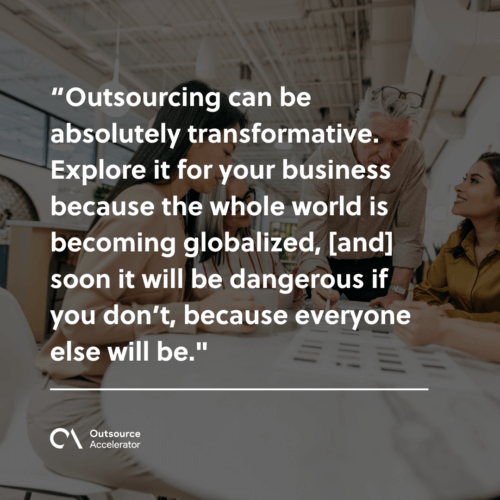Outsourcing Meets Real-World Business – Derek’s Interviewed by Gurmeet Judge

In this week’s episode, Derek joins Gurmeet Judge of the Business Leadership Podcast.
Gurmeet is a successful businessman and the founder and CEO of Encompass Solutions, an IT services and consulting firm.
Derek shares his insight, excitement, and expertise about the benefits of outsourcing and building teams composed of global talent.
Coming into the outsourcing sector
Derek describes Outsource Accelerator as the “Tripadvisor for the outsourcing industry.”
“We list about 3,000 outsourcing firms globally, and that covers the whole spectrum of outsourcing, right from the big call centers down to the smaller, next-gen outsourcing firms or offshore staffing or staff leasing.”
Going a bit into his history, he says that he sort of “fell into” the outsourcing sector, being “driven by entrepreneurship and business.”
He began outsourcing for his third venture, as part of his business involving corporate housing in central London.
“We basically built the back end in the Philippines.
It started with just customer service, but [I] very quickly realized [that] you can do everything in the Philippines.
It’s amazing what you can do remotely. We had probably 70 percent of our staff in the Philippines, as opposed to central London. And so I spent more time in the Philippines, and of course, I saw the power of the outsourcing industry.”
This perspective gave him the idea to establish the concept of Outsource Accelerator.
“I wanted to evolve my next business to become a marketplace representing the industry because [it’s] huge.
It’s incredible, it’s sophisticated, but it’s hard for people such as yourself to really navigate around the industry. So I built the marketplace to help people explore the industry and learn about outsourcing.”
Benefits of a global talent pool
Derek explains that what he talks about is not really outsourcing or call centers as a concept per se but more of global employment and offshore staffing.
“If you can work remote, then you’re not actually restrained to where you should employ and hire your talent pool from. So you can start to look globally.
When you do that, you open up the catchment area to potentially seven billion people. It’s such a vast opportunity for people to hire now globally instead of their local market.”
He also heavily touts the quality of the talent pools in different countries, seeing them as fundamentally identical. He describes the Philippines as an example.

“I’m currently based in Manila, and within the Philippines you have multibillion-dollar companies, you have conglomerates, MBAs, and Harvard graduates.
Every large company is based in the Philippines, and you get anything you want [here]. You can easily find developers, accountants, bookkeepers, designers, marketers, CSRs, salespeople, administrators, the whole gambit.”
He gives some advice on how to leverage this.
“What you should be doing is seeking out the top professionals and paying them well. You’ll still be saving significant money and you’ll be accessing fantastic, highly capable staff that you won’t be disappointed with.”
He then goes into a few other reasons why companies choose to outsource.
“You typically save 50 to 70 percent of your all-in staffing costs. [And] when you partner with a reputable outsourcing firm, you also get a really strong, valuable partnership to help you build out your operations offshore.
You get all that kind of a white-glove service, all of the sort of annoying admin of running a business is managed for you.”
Managing a cultural team
Derek has written a book, Inside Outsourcing, that delves into the mechanics of outsourcing.
“I really realized that all of the fundamentals of how to outsource are completely the same as management fundamentals.
[It’s] how you manage a team properly, how you get them on board with your mission, how you recruit people, how you manage accountability.

All of that is basically identical, but it’s a little bit different [because] you have to acknowledge different sorts of cultural interactions and communications.”
When asked about how to build a team culture, Derek answers, “The whole world has been grappling with [that] since COVID, [and] it’s a little bit harder to build strong bonds.
But there’s a lot of ways around that. It’s just being conscious, and if you’re making an effort, then the staff will love you.”
Closing off, Derek encourages more companies to consider outsourcing as part of their staffing strategies.
“It can be absolutely transformative. Just really explore it for your business because the whole world is becoming globalized, [and] soon it will be dangerous if you don’t, because everyone else will be.”
You may learn more about Outsource Accelerator by browsing the website. Derek is also happy to chat through his email at derek@outsourceaccelerator.com.







 Independent
Independent




